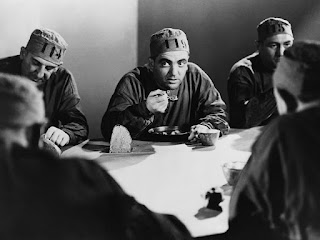Something tells me Jacques Tati was a fan of this film, with its slapstick and its railing against the dehumanizing effects of modern technology. It's probably most notorious because the film distribution company sued Charlie Chaplin because there are a couple of scenes in his later Modern Times (which is almost entirely a silent, even though it was released 4 years after this talkie) that are suspiciously similar. The director, René Clair, refused to endorse the lawsuit as he was a huge Chaplin fan (and you can tell) and claimed to have been influenced originally by the man himself. Like Modern Times, there are scenes in a prison (in fact, that's where this one begins) and involving an assembly line, but it's not like either was a rare thing in films of this era.
Anyway, as I said, the film begins (and appears to be a silent film at first, something that might have been intentional, as Clair made his reputation as an innovative director of visually inventive silents, and was reputedly skeptical of the talkies) with convicts assembling wooden horse toys at a long wooden table.
They sing as one, and if they don't sing a song with the title as part of the lyrics at this point, they do soon. As they sing, one slightly chubby dark-haired convict
winks to a shrimpier one across the table and he, after winking back,
keeps jogging the arm of the weaselly-looking man next to him. Eventually this annoys the man so much that a fight starts and the guards come rushing over, which is the cue for the dark-haired man (whose name, we find out later, is Louis) to pick up a metal hook off the floor and stuff it in his sock. This is used later as a grappling hook in their (Louis and the shrimpy man, whose name is Emile) escape. (As they were escaping Jami was trying to remember what other French prison-break movie we'd watched - she was thinking of either A Man Escaped or Army of Shadows). Sadly, Emile gets stranded somewhere between the double walls but shouts encouragement to Louis and then leads the guards on a merry race, while Louis makes it out, accidentally knocks a bicycle racer off his bike
and then equally accidentally, wins the race. He gets caught up in the celebration until he sees a cameraman about to take his photo and scarpers. We then follow Louis as he cleverly robs a clothes store till (by pretending to have been mugged while the proprietor was in the back looking for handkerchiefs) and somehow builds a record-player empire from scratch.
He also develops a production-line technology, and when Emile finally gets out, and is enjoying lounging around in a field,
he is dragooned by some Gendarmes (work is MANDATORY) into working on it. The rather dreamy Emile is smitten by a young woman who works at the front desk at the factory,
whom we see is herself taken with another, much more strapping worker, and who is guarded by her ancient uncle, who administers kicks on the backside to any male who comes near her. Various shenanigans take place until Emile and Louis are accidentally reunited. Initially Louis pretends not to know Emile, then he tries to buy him off, but then he melts and they are as happy a pair as when first we saw them,
when Emile stood on Louis's shoulders to saw through the bars (and to make the link, in both instances Emile accidentally cuts his wrist and Louis solicitously bandages it with a strip ripped off his handkerchief.) (Emile has a handkerchief, but it comes from the young woman, so he refuses to use it). It turns out that Louis has made himself a man of high society, but that the people he is forced to consort with are horrible and his wife hates him and is having an affair with a snooty Lothario. So, while we feel nervous for him with his old cellmate back in his life at a crucial moment in the expanse of his business (he is about to open a fully automated factory to make his latest model record player (which looks like a hatbox),
he is clearly happier than he has been in years.
Until... Emile is leaving Louis's mansion after spending the night and he bumps into the weaselly man from the beginning, who puts two and two together... That day Emile confesses his love for the young woman, and Louis tries to arrange a marriage (the uncle is happily on board, although the woman isn't) and at the end of the day Emile sets off to dine with uncle and niece, and Louis heads home to get ready for another fancy meal... only to find his butler tied up and a hoard of his old prison-mates singing lustily in one of his parlors. He realizes instantly they've got him where they want him, because they've got photos of him in his convict days (many copies, so burning one set is no help)
(although, you'd think somebody would've put two and two together - he's not exactly hiding away, being one of the city's major movers and shakers), and from that moment on it's a race to see whether he gets put away or if he can grab some fistfuls of cash and do a runner. I was actually pretty tense - I wanted him to get to keep some of the money he'd made. But that's not the message of the movie. There's a reason it's called after the song they sung happily in prison, when they had nothing but their friendship. But hey, at least Louis gets to inaugurate his fully automated factory and (because he's got nothing to lose) transfer ownership to his employees, who now get to fish and dance and play cards as the machines do the work - it's a Marxist dream!













No comments:
Post a Comment